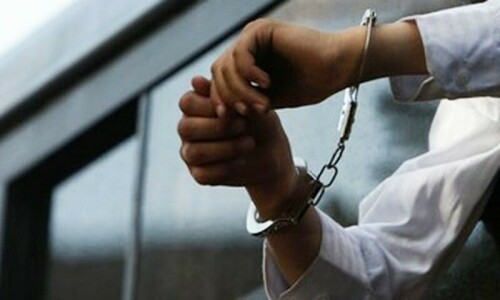KARACHI, July 25: Health officials on Friday reported the second death caused by dengue fever in 2008 in Karachi, strengthening the experts’ view that dengue is now a year-round problem – and not a post-monsoon phenomenon – and setting alarm bells ringing among the health managers of the city.
The medical superintendent of the city district government Karachi-run Abbasi Shaheed Hospital, Dr Hamid Zaheer, said that a 20-year-old woman, resident of North Karachi, tested positive for dengue fever, and despite best efforts could not be saved. She died within 18 hours of her admission to the hospital on Thursday.
Tracing the health history of the deceased, Dr Zaheer said that the woman in question, who reported a very low platelet count (15,000) and a marginal haemoglobin level, had reported to a private hospital in Block I, North Nazimabad, on July 21, but did not want to be admitted, despite the doctors’ advice.
“The record said that the patient had a platelet count of 99,000 and haemoglobin level of 12, besides suffering from fever and bleeding from different parts of her body when she reported to the private hospital. Had she been admitted there or in some other facility, she could have survived,” the medical superintendent added.
He further said that doctors at Abbasi Hospital, after receiving her in the emergency section at around 11.30pm on July 23, had shifted her, in view of her critically decreased platelet count due to profuse bleeding from the nose, mouth, ears and other parts of the body, to the medical ICU of the hospital, where she was administered packs of blood cells in good quantity and was also given mega units of platelets. “But she failed to recover as perhaps she reported to the hospital very late,” Dr Zaheer observed.
It was further learnt that before being admitted to Abbasi Hospital, the woman, during the day, was also taken to another private hospital in the North Nazimabad area, but she was asked to go elsewhere as no bed was available for admission there.
The senior doctor said that two to three patients suspected of suffering from hemorrhagic fever had been reporting to Abbasi’s dengue ward every week.
Earlier, a 35-year-old man, resident of Paposh Nagar, Nazimabad, died due to dengue fever at Abbasi Hospital on June 24, the first dengue death of 2008 as reported by the doctors.
Last year, about 2,600 people reported to the major government and private hospitals in Karachi for treatment of dengue fever, out of which 22 could not survive and succumbed to the mosquito-borne disease.
“During the last season of dengue we received a good number of dengue cases, but there was no death at our hospital, while this year two deaths have taken place in a span of one month, and that too before the advent of the monsoon, which is surely an indication that patients who had already suffered from dengue are being re-bitten by the dengue-causing Aedes aegypti mosquito,” said another doctor of Abbasi Hospital.
A virus that is transmitted by the bite of the female Aedes mosquito causes dengue and has been occurring frequently in recent years in Karachi and other parts of Sindh, particularly during the post-monsoon season.
Sanitary conditions
According to experts, the situation demands a highly trained force comprising both the city and the provincial governments’ officials and health providers, who could sensitize people about improved water and sanitation conditions.
The leaking water from pipelines that form pools are surely the ideal breeding grounds for the Aedes aegypti mosquito, while on the other hand the community’s slackness in disposing of solid waste and other junk properly is also a reason behind the spread of dengue fever virus, it was further said.
“To manage the mosquito menace and check the situation, the health department of the city government has been undertaking more and more fumigation as part of its anti-larval initiatives,” says Dr A.D. Sajnani, the Executive District Officer (Health) of the CDGK.
According to him, the CDGK had also supplied medicated mosquito nets to some hospitals, including the Civil Hospital Karachi and Jinnah Postgraduate Medical Centre, for further usage by patients discharged after dengue fever treatment so that they would be protected from mosquito bites in their homes.
Talking about testing facilities against dengue virus, the EDO health said that Abbasi Shaheed Hospital and the New Karachi Hospital were offering free diagnostic services to suspected dengue patients, while arrangements for supply of platelet units was also in place at some private concerns under the aegis of the city government.















































Dear visitor, the comments section is undergoing an overhaul and will return soon.